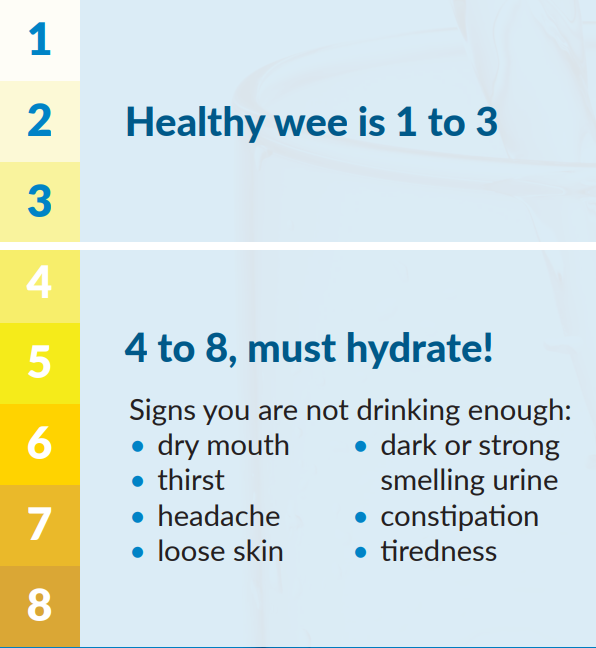Water makes up two thirds of our body. It is vital we drink enough fluid to maintain a healthy balance.
Most people get dehydrated by not drinking enough fluids or by losing fluids and not replacing them.
View the wee chart below:
Healthy wee (1-3) is a light yellow colour. If you are dehydrated your wee (4-8) may be dark yellow.

What should you drink?
Aim for at least eight cups per day. Any fluid, except alcohol counts including milk, water, tea, coffee and fruit juice. Other foods such as ice cream, ice-lollies, jelly, soup, yoghurt, milk puddings or water rich fruits such as melons can also count towards your fluid intake. The key is to drink regularly throughout the day.
Who is at high risk?
You may be at risk of dehydration if you:
- are dependent on others to get you drinks or food
- have swallowing problems
- have a high temperature
- have diarrhoea and/or vomiting
- have taken part in physical activities
- are limiting your drinks because you have difficulty getting to the toilet on time
- are limiting your drinks because you don’t want to get up through the night to go to the toilet
Good hydration can assist in preventing or treating:
- urinary tract infections
- headaches
- constipation
- dizziness (this can lead to falls)
- confusion
- kidney stones
- poor oral health
- pressure ulcers / skin conditions
Spotting the signs and symptoms of dehydration
- drinking less than usual
- feeling thirsty (although not everyone feels thirsty)
- dark coloured or small amounts of urine
- headaches
- tiredness
- dry mouth, lips or eyes
- lack of concentration
- confusion
- constipation
- urinary tract infections
What to do if you are concerned about yourself or someone you know
You can help prevent dehydration by:
- recognising the early warning signs
- don’t wait until you are thirsty before having a drink
- make sure you have enough things available to drink throughout the day
- try to have a glass of water or juice handy at all times
- if you are having problems using utensils or the kettle, Occupational Therapy can help. Speak to your GP or nurse at the clinic as they will be able to advise you where to go for help
- if you are worried about getting to the toilet on time you should speak to your GP or nurse who can refer you to someone who can help
If you are concerned about someone else, consider:
- sitting down and having a drink or cup of tea with them
- talking them through the warning signs of dehydration
- encouraging them to have 6-8 drinks per day
- planning visits around mealtimes to get a sense of what they are drinking and if they
have any difficulties drinking - having a look in the fridge or cupboards to check they have enough things to drink
- encouraging them to attend local cafés / local lunches / visiting voluntary, community or faith organisations with luncheon clubs
- ensuring both hot and cold drinks are safely and freely accessible
- supporting access to both social and health services
- setting reminder alarm to remind them to have a drink